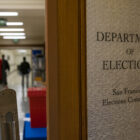See our March 2024 SF Election Guide for a nonpartisan analysis of measures and contests on the ballot in San Francisco for the election occurring March 5, 2024. Voters will consider the following proposition in that election.
As of September 2023, San Francisco employed 1,578 “full-duty sworn” police officers paid from the city’s general fund. A recent staffing analysis from the Police Department recommended that the city employ 2,182 full-time police officers. The city charter does not set a minimum number of police officers.
Proposition B, a proposed amendment to the city charter, would set permanent staffing levels for the Police Department and would require that new positions be paid for by new taxes or other revenue allocated from outside the general fund.
If it passes, the measure would go into effect only if voters approved an unspecified new tax source in a future election.
Under Proposition B, minimum police staffing would rise from 1,700 in the first year to 2,074 in the fifth year. If the new tax source, once approved, failed to fund the increased staffing in any given year, the city would be required to maintain the voter-mandated staffing level with money from the general fund.
Current staffing for the department is determined every two years by the Police Commission, which drafts the Police Department’s budget with recommendations from the chief of police. The budget then goes to the Board of Supervisors and the mayor, who may amend it further.
Under Proposition B, the chief of police would set staffing level recommendations every five years instead of every two years.
This charter amendment was proposed by Supervisor Matt Dorsey, a former Police Department public information officer, to increase police staffing over the next five years using money from the general fund. That plan was amended in committee by Supervisor Aisha Safaí to include the new tax funding requirement. The Board of Supervisors voted 6 to 5 to put the modified measure before the voters.
Those opposing Proposition B, including its original architect, Dorsey, say the current measure “aims to fool voters” by making them think a yes vote will increase police staffing and recruitment, while its proponents are “obstructing desperately needed progress.”
City Controller Ben Rosenfield in his analysis of Proposition B noted that it would “establish a binding required appropriation” of up to $200 million over the first five years from an unspecified, new tax source and would “reduce General Fund dollars that could otherwise be allocated by the Mayor and the Board of Supervisors in the annual budget” if the new taxes failed to cover the cost of the additional officers.
Proposition B supporters include Safaí, who said the measure is “fiscally responsible” and doesn’t pit police officer recruitment against 911 call operators, nurses, paramedics, firefighters and sheriffs because it seeks funding from new sources.
Proposition B supporters have raised $605,000 as of publication, Ethics Commission records show. All of these funds were linked to three organized labor groups: SEIU Local 1021, IFPTE 21 and the San Francisco Building and Construction Trades Council. Opponents have raised nearly $538,000, including over $377,000 from Neighbors for a Better San Francisco Advocacy and $50,000 from Michael Moritz, venture capitalist and backer of The San Francisco Standard.
Proposition B requires more than 50% affirmative votes to pass.
A “yes” vote on Proposition B means you support amending the city charter to set permanent staffing levels for the Police Department and requiring that new positions be paid for by new taxes or other revenue allocated from outside the general fund.
A “no” vote on Proposition B means you do not support amending the city charter to set permanent staffing levels for the Police Department and requiring that new positions be paid for by new taxes or other revenue allocated from outside the general fund.







